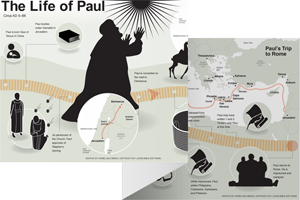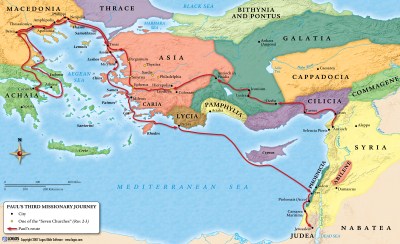20:1–6 Paul’s third missionary journey (circa ad 52–57) focuses on his efforts to strengthen churches. |
20:1 travel to Macedonia In chs. 16–17, Paul ministered in Macedonia. He now retraces his steps.
20:3 three months Paul spends some time in Greece, likely in Corinth, as he did before (18:11; see 1 Cor 16:6).
return through Macedonia This journey would take him past more churches he had established or strengthened.
20:5 Troas A major port city along the Aegean Sea in the Roman province of Asia and modern Turkey, northwest of Ephesus.
20:6 we sailed Luke, the narrator, includes himself again in the narrative here. See Acts 16:10 and note.
Philippi The city itself is located about nine miles from the Aegean coast and the port is about 150 miles northwest of Troas by sea. Compare 16:12–40; note on 16:12.
Unleavened Bread The festival of Passover (Exod 12).
20:7–12 Luke transitions from an overview of Paul’s travel and draws attention to his miracle involving Eutychus. The mighty deed performed by Paul depicts the power that drives the Church: the resurrection of Jesus (Acts 1:2–3; 2:24). |
20:7 first day Refers to Sunday.
to break bread Possibly referring to the Lord’s Supper, which often accompanied a fellowship meal (e.g., 1 Cor 11:17–34). This may also refer to simply the sharing of a meal with fellow Christians.
20:10 threw himself on him Paul’s actions recall the act of Elisha, who did a similar action for the Shunammite woman’s son (2 Kgs 4:34). When Elisha did this, the dead boy was revived.
his life is in him Eutychus was dead (Acts 20:9), but because of Paul’s actions, he is raised from the dead. Paul makes this statement either because he is confident of Eutychus’ resurrection or because at this point Eutychus has already been resurrected. Compare 9:36–42.
 Miracles in Acts Table
Miracles in Acts Table
20:13–16 Paul’s mission transitions from strengthening churches to his return to Jerusalem. |
20:13 But we went on ahead Referring to Luke (the narrator) and those traveling with Paul (16:10).
Assos A port city. Located along the coast of the Roman province of Asia, which is in modern Turkey—approximately 20 miles south of Troas (v. 6).
20:14 Mitylene A port on the island of Lesbos.
20:16 day of Pentecost Paul’s arrival at Pentecost to announce the completion of his third journey would testify to the tremendous work Christ has done to build His church. Compare ch. 2.
20:17–38 Paul’s speech describes his desire for the church in Ephesus to grow strong and play a leading role among the churches in the region. |
20:17 he sent word to Ephesus and summoned the elders While Paul intends to hurry through this region, he makes an effort to have one last moment with those from Ephesus (compare ch. 19). Paul does not want to travel to Ephesus itself because he wants to ensure the efficiency of his journey to Jerusalem (v. 16).
elders Paul commissioned elders (presbyteros) to help organize and lead churches after his departure (compare 14:23).
 Episkopos and Presbyteros Word Study
Episkopos and Presbyteros Word Study
20:18 first day Paul bases his argument on his actions that have consistently supported his character.
20:19 serving Paul has been faithful to God’s calling and has served Jesus sacrificially.
with the trials Demonstrates the struggle in Paul’s work.
20:20 proclaiming The proclamation of the gospel was central to Paul’s calling as an apostle to the non-Jewish people (see 1 Cor 9:16).
20:21 repentance Acknowledging sin and turning from it to follow Christ (Acts 2:38).
20:23 the Holy Spirit testifies Compare 16:6.
20:24 gospel of the grace of God Refers to the message of Jesus’ sacrificial death and resurrection, which allows people to be made right before God the Father.
20:25 the kingdom Refers to the kingdom of God, which was inaugurated by Jesus. See note on 1:3; note on Mark 1:15.
20:26–28 Paul states that he has completed his responsibilities to the Ephesian believers. Paul can make this statement because he has shared the complete message of the gospel to those in Ephesus and because he now will pass his responsibilities to the elders (or overseers) of Ephesus. The language borrows from 1 Sam 12:2–5, where Samuel declares his innocence and holds the audience accountable. |
20:27 the whole purpose of God Paul’s preaching has covered all the core principles God has revealed to him about His purposes. Here he seems to be specifically referring to the message of salvation in Jesus, but he could also more broadly be speaking of passing along the necessary knowledge for the Ephesian elders to continue the work of the gospel.
20:28 overseers The Greek word used here, episkopos, refers to those with leadership responsibility over the church. These leaders are likely collectively responsible for multiple churches.
 Episkopos and Presbyteros Word Study
Episkopos and Presbyteros Word Study
20:29 wolves Since Paul has called the Church a flock and the elders its shepherd, he extends the metaphor to label false teachers as wolves.
20:32 sanctified This term usually refers to the process of God transforming a person’s life to make them holy (set apart) for Him. Here it seems to refer to believers in Jesus in general who have been made holy because of Christ’s sacrifice on their behalf.
20:35 It is more blessed to give than to receive This phrase is not recorded in the Gospels, though Jesus did more than is recorded there (compare John 21:25).
20:38 distressed The Greek word used here, odynaō, connotes severe pain or agony. Here, it emphasizes the difficult they faced and shows they are convinced that they will not see Paul again.

|
About Faithlife Study BibleFaithlife Study Bible (FSB) is your guide to the ancient world of the Old and New Testaments, with study notes and articles that draw from a wide range of academic research. FSB helps you learn how to think about interpretation methods and issues so that you can gain a deeper understanding of the text. |
| Copyright |
Copyright 2012 Logos Bible Software. |
| Support Info | fsb |
 Loading…
Loading…


